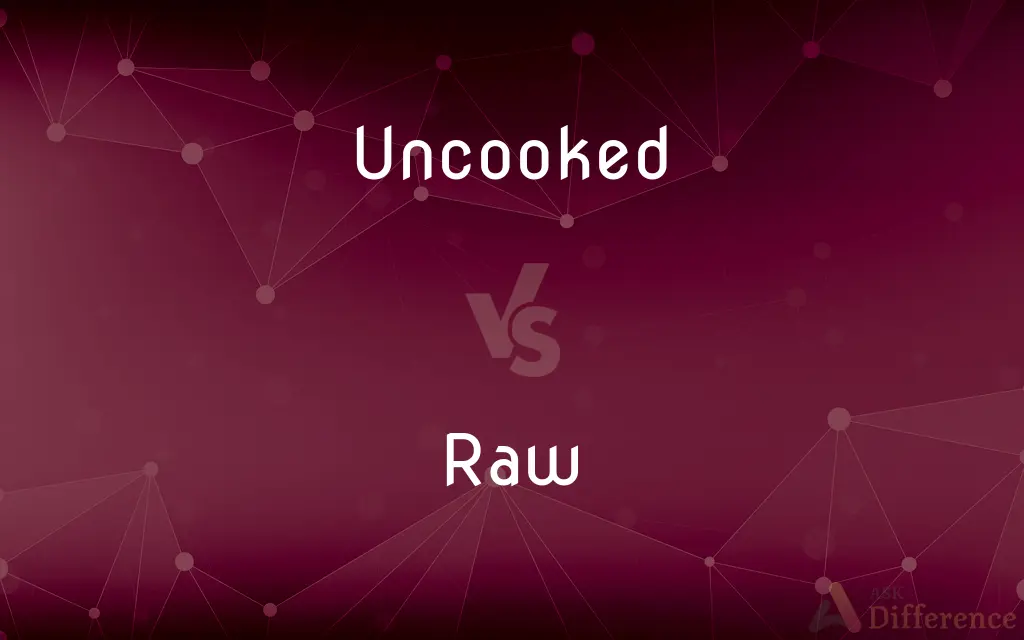Uncooked vs. Raw — What's the Difference?
By Fiza Rafique & Maham Liaqat — Updated on March 7, 2024
Uncooked refers to food that has not undergone a cooking process, while raw denotes food in its natural, unaltered state, not subjected to any form of cooking or processing.

Difference Between Uncooked and Raw
Table of Contents
ADVERTISEMENT
Key Differences
Uncooked food is simply food that hasn't been cooked, regardless of whether it is intended to be eaten in its uncooked state or is meant to be cooked before consumption. Raw food, on the other hand, emphasizes the natural, unprocessed state of the food. Raw foods are not only uncooked but also unprocessed, highlighting their purity and untouched nature.
While all raw foods are inherently uncooked, not all uncooked foods can be considered raw. For example, a steak before cooking is both uncooked and raw, but a marinated steak, although uncooked, is not raw due to the addition of other ingredients and the marination process.
The distinction between uncooked and raw is also important for dietary and health considerations. Raw diets, which consist of only raw foods, are based on the premise that cooking may diminish the nutritional value of food. Meanwhile, some uncooked foods may still require cooking to be safe for consumption, due to the presence of harmful bacteria or toxins that cooking processes eliminate.
Understanding the difference between uncooked and raw can guide food preparation and dietary choices, emphasizing the significance of the cooking process and the state of food in terms of health, nutrition, and culinary practices.
Comparison Chart
Definition
Food that has not been subjected to a cooking process.
Food in its natural, unprocessed state, not subjected to cooking or significant processing.
ADVERTISEMENT
Emphasis
On the absence of cooking, regardless of whether the food is typically cooked or eaten uncooked.
On the natural, untouched state of the food, highlighting its purity and lack of processing.
Examples
Uncooked pasta, uncooked rice.
Raw fruits, raw vegetables, raw nuts.
Dietary Consideration
May include foods that require cooking for safe consumption.
Often associated with raw food diets, focusing on foods consumed in their natural state for health reasons.
Processing
Can include minimal processing, as long as the food has not been cooked.
Typically excludes significant processing, preserving the food's natural state.
Compare with Definitions
Uncooked
Refers to ingredients that are in a state before cooking.
She measured two cups of uncooked rice for the recipe.
Raw
In a natural, unprocessed, and uncooked state.
He included a variety of raw vegetables in his salad.
Uncooked
Not cooked or not having been subjected to heat or another cooking process.
The uncooked chicken must be thoroughly cooked to ensure it's safe to eat.
Raw
Central to raw food diets, emphasizing uncooked and unprocessed foods.
The raw food diet consists mainly of fruits, vegetables, nuts, and seeds.
Uncooked
Some uncooked foods need to be cooked to eliminate harmful pathogens.
Consuming uncooked eggs may pose a risk of salmonella infection.
Raw
Often considered to retain more nutrients compared to cooked counterparts.
Raw spinach contains high levels of vitamin C, which can be reduced by cooking.
Uncooked
Includes a wide range of foods, both those typically cooked and those not.
Uncooked beans must be soaked and cooked before eating.
Raw
Excludes foods that have been processed, even if not cooked.
Raw almonds are unroasted and unsalted, maintaining their natural state.
Uncooked
Uncooked is a New York-based company most notable for their snarky and strange greeting cards. Founders and creators Natalie Carbone and Armand Prisco started the company in 2004 after quitting their jobs in advertising.
Raw
Uncooked
Raw meat.
Uncooked
Not cooked; raw.
Raw
Being in a natural condition; not processed or refined
Raw wool.
Uncooked
Raw and not cooked, especially of something that should be, or is sometimes cooked
Raw
Not finished, covered, or coated
Raw wood.
Uncooked
Simple past tense and past participle of uncook
Raw
Not having been subjected to adjustment, treatment, or analysis
Raw data.
The raw cost of production.
Uncooked
Not cooked
Raw
Undeveloped or unused
Raw land.
Raw
Recently finished; fresh
Raw plaster.
Raw
Inexperienced or untrained
A raw youth.
Raw recruits.
Raw
Having subcutaneous tissue exposed
A raw wound.
Raw
Inflamed; sore
A raw throat.
Raw
Unpleasantly damp and chilly
Raw weather.
Raw
Powerfully impressive; stark
Raw beauty.
Raw talent.
Raw
Direct in description and explicit in realistic detail
The film's raw depiction of urban poverty.
Raw
Crude, vulgar, or coarse
Raw language.
Raw
(cooking) of food Not cooked.
There's nothing but raw eggs for breakfast.
Raw
Not treated or processed; in a natural state, unrefined, unprocessed.
Raw cane sugar
Raw sewage
Raw
Having had the skin removed or abraded; chafed, tender; exposed, lacerated.
A raw wound
Raw
New or inexperienced.
A raw beginner
Raw
Crude in quality; rough, uneven, unsophisticated.
A raw voice
Raw
Uncorrected, without analysis.
Raw
Unpleasantly cold or damp.
A raw wind
Raw
Unmasked, undisguised, strongly expressed.
Raw emotion
Raw
Candid in a representation of unpleasant facts, conditions, etc.
A raw description of the American political arena
Raw
(obsolete) Not covered; bare; bald.
Raw
An unprocessed sugar; a batch of such.
Raw
A galled place; an inveterate sore.
Raw
A point about which a person is particularly sensitive.
Raw
A recording or rip of a show that has not been fansubbed.
Raw
A scan that has not been cleaned purged of blemishes arising from the scanning process and has not been scanlated.
Raw
Not altered from its natural state; not prepared by the action of heat; as, raw sienna;
Raw
Hence: Unprepared for use or enjoyment; immature; unripe; unseasoned; inexperienced; unpracticed; untried; as, raw soldiers; a raw recruit.
Approved himself to the raw judgment of the multitude.
Raw
Not worked in due form; in the natural state; untouched by art; unwrought.
Raw
Not covered; bare.
And all his sinews waxen weak and rawThrough long imprisonment.
Raw
Disagreeably damp or cold; chilly; bleak; as, a raw wind.
Raw
A raw, sore, or galled place; a sensitive spot; as, to touch one on the raw.
Like savage hackney coachmen, they know where there is a raw.
Raw
Informal terms for nakedness;
In the raw
In the altogether
In his birthday suit
Raw
(used especially of commodities) in the natural unprocessed condition;
Natural yogurt
Natural produce
Raw wool
Raw sugar
Bales of rude cotton
Raw
Having the surface exposed and painful;
A raw wound
Raw
Not treated with heat to prepare it for eating
Raw
Not processed or refined;
Raw sewage
Raw
Devoid of elaboration or diminution or concealment; bare and pure;
Naked ambition
Raw fury
You may kill someone someday with your raw power
Raw
Brutally unfair or harsh;
Received raw treatment from his friends
A raw deal
Raw
Not processed or subjected to analysis;
Raw data
The raw cost of production
Only the crude vital statistics
Raw
Untempered and unrefined;
Raw talent
Raw beauty
Raw
Unpleasantly cold and damp;
Bleak winds of the North Atlantic
Raw
Inflamed and painful;
His throat was raw
Had a sore throat
Raw
Used of wood and furniture;
Raw wood
Raw
Lacking training or experience;
The new men were eager to fight
Raw recruits
He was still wet behind the ears when he shipped as a hand on a merchant vessel
Common Curiosities
Can cooking make some nutrients more bioavailable?
Yes, cooking can increase the bioavailability of certain nutrients, such as lycopene in tomatoes and beta-carotene in carrots, making them easier for the body to absorb.
Why do some people prefer a raw food diet?
Proponents of raw food diets believe that cooking can destroy enzymes and reduce the nutritional value of food, so eating raw foods maximizes health benefits.
Is it possible for a food to be neither raw nor uncooked?
Yes, foods that have been processed in ways other than cooking, such as curing, smoking, or fermenting, are neither raw nor uncooked.
Can the term 'uncooked' apply to foods typically consumed raw?
The term 'uncooked' is less commonly used for foods that are traditionally eaten raw, such as fruits and vegetables, as it is somewhat redundant in these contexts.
How can someone ensure they're safely consuming raw foods?
Ensuring safety with raw foods involves proper washing, handling, and sourcing from reputable suppliers, especially for foods like raw fish or sprouts that can carry a higher risk of contamination.
How does the preparation of raw foods differ from uncooked foods?
Preparation of raw foods often involves techniques like chopping, blending, or dehydrating, without applying heat, whereas uncooked foods may undergo preparations like marinating or soaking before they are eventually cooked.
Can uncooked food be eaten safely?
It depends on the food. Some uncooked foods, like certain fruits and vegetables, are safe and often eaten raw, while others, like meats and eggs, can pose health risks if not cooked.
Are there any risks associated with eating raw foods?
While many raw foods are healthy, there can be risks, such as exposure to harmful bacteria or toxins in some raw animal products or untreated water sources.
What impact does eating uncooked grains and legumes have on digestion?
Consuming uncooked grains and legumes can lead to digestive issues since they contain complex carbohydrates and proteins that are difficult to digest without cooking, as well as anti-nutritional factors that cooking helps to neutralize.
What are some common misconceptions about raw and uncooked foods?
Common misconceptions include the idea that all raw foods are inherently healthier than cooked foods, or that uncooked foods are always safe to consume. Nutritional value and safety can vary widely depending on the food and its preparation.
Are there any environmental benefits to eating more raw or uncooked foods?
Eating more raw foods can reduce energy consumption associated with cooking and can also lower the demand for processed foods, which often have a higher environmental footprint.
Can raw and uncooked foods contribute to a balanced diet?
Both raw and uncooked foods can be part of a balanced diet, offering a range of nutrients. It's important to include a variety of food types and preparation methods to ensure nutritional adequacy.
Are there any cultural practices that involve predominantly raw or uncooked foods?
Yes, several cultural practices and cuisines emphasize raw foods, such as sushi in Japanese cuisine, carpaccio in Italian cuisine, and various raw salads and dishes in raw foodist communities.
How does the texture and flavor of food change when it's raw versus uncooked?
Raw foods retain their natural texture and flavor, which can be crisp and vibrant. Uncooked foods, especially those intended to be cooked, may have a harder texture and less palatable flavor until they are cooked.
Is it possible to have a food allergy that's specific to raw but not to uncooked (cooked) foods?
Yes, some individuals may experience allergic reactions to certain raw foods due to specific proteins that can be altered or denatured by cooking, reducing or eliminating the allergic response.
Share Your Discovery

Previous Comparison
Convent vs. Monastery
Next Comparison
Australasia vs. AustraliaAuthor Spotlight
Written by
Fiza RafiqueFiza Rafique is a skilled content writer at AskDifference.com, where she meticulously refines and enhances written pieces. Drawing from her vast editorial expertise, Fiza ensures clarity, accuracy, and precision in every article. Passionate about language, she continually seeks to elevate the quality of content for readers worldwide.
Co-written by
Maham Liaqat















































